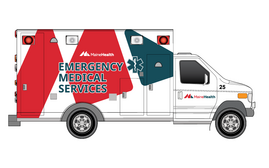A new focus on mental wellness at work
 PHOTO/TIM GREENWAY
Thomas Downing, director of the Lifeline Workplace Wellness Program at Maine Medical Center's Falmouth Family Health Center, is developing a pilot program to help employers identify and address employees' mental health
PHOTO/TIM GREENWAY
Thomas Downing, director of the Lifeline Workplace Wellness Program at Maine Medical Center's Falmouth Family Health Center, is developing a pilot program to help employers identify and address employees' mental health
Mental health in the workplace can be an awkward issue for employers to address, but the cost is clear. An estimated 217 million workdays and $44 billion in productivity is lost nationwide each year to mental disorders — with anxiety, panic and depression ranking among the top five chronic conditions leading to workplace impairment, according to studies from the National Alliance on Mental Illness and the Centers for Disease Control and Prevention.
Workplace wellness is a perennial issue for companies of all sizes — healthier employees mean lower health care costs and higher productivity — but the taboos around mental health can often mean that illnesses such as depression and anxiety go unaddressed and unreported.
The problem is no less pertinent here in Maine, where a 2010 survey by Maine Medical Center's Lifeline Workplace Wellness Program and the MMC Portland Identification and Early Referral program found that a majority of Maine employers were unprepared to deal with issues of mental health in the workplace.
"Mental illness can end up being siloed out and not considered part of an employer's larger wellness model. My job is to change that," says Thomas Downing, director of MMC's Lifeline Workplace Wellness Program, which helps employers around the state address issues of employee wellness.
Of the 118 Maine employers surveyed in the 2010 study, two-thirds said that while they agree that employers should "play a significant role in providing information to employees and training to supervisory staff ... they do not have adequate information and training to do so," according to Downing.
A new pilot program being developed between Downing and colleagues at MMC and MaineHealth aims to address that information and training gap.
Still in its formative stages, the Mental Health Workplace Wellness model will provide employers of all sizes with a framework of best practices and training information to help Maine companies take a more proactive role in heading off the effects of mental illness in the workplace.
"Mental illness transcends all genders, ages, ethnicities and socio-economic classes; it has no discrimination," says Downing. "Research indicates that one in four people has some type of mental illness, so it doesn't matter what size your company is, there is mental illness in that organization."
Having enlisted a graduate student in health policy from the University of Southern Maine's Muskie School of Public Service to complete a literature review of worksite mental health models, the effort now moves into the next stage.
"We've already found some really fascinating models that already exist," says Downing, citing Canadian and British programs that they hope to build on and retool for the specific needs of Maine employers. "We are picking and choosing those best practices already in place to put together our own model."
One model, developed in the United Kingdom, emphasizes the need for training mental health "first aid" helpers in the workplace, an idea that Downing plans to explore in drafting the pilot program. "We've all heard of first aid, but we've never heard of that before. This is a 12-week course that individuals can take to learn more about what is mental illness and they can learn to be helpers," he says.
Armed with a white paper and logic model outline, the group will seek grant funding to cover the cost of a project manager, with hopes of launching a pilot program and tapping employers to participate by sometime in 2013, according to Downing.
Small businesses 'vulnerable'
"When you talk about mental health, you're talking about a lot of different things — from issues like alcoholism and substance abuse to marital issues, stress, depression," says Rick Dacri, a human resources consultant who runs the firm Dacri & Associates LLC.
"All of those things are carried over into the workplace and impact how individuals do their jobs; the fact is that people don't leave their issues at the door," he says.
But a company's size and resources can impact its ability to address complex and touchy mental health issues, according to Dacri.
Larger companies can tap Employee Assistance Programs, often coordinated through a company's insurance, for additional training and on-site support. "One wouldn't expect employers to have the skill set to deal with these sorts of issues, so that's why a lot of them have reached out to EAPs to help them," says Dacri.
But that option can be too costly for some smaller organizations, an issue that Downing and the Lifeline group hope to address with the pilot program.
"A vast majority of Maine companies are smaller operations, and most do not have an EAP," says Downing. "We feel that the small-business sector is particularly vulnerable because that set of tools is not there for them and they are doing things on their own."
At a conference on workplace depression hosted by MaineHealth last August, Coffee by Design founder Mary Allen Lindemann provided a poignant example of the struggles smaller businesses can face in dealing with mental wellness in the workplace, recounting her experience 12 years ago with a suddenly and severely depressed employee.
"All of a sudden we have a staff member whose behavior changed dramatically and we're trying to figure out what happened and how did we miss the signs," says Lindemann, whose Portland-based chain of coffee shops was the subject of a case study on mental health-friendly workplaces by the U.S. Department of Health and Human Services.
The employee was eventually hospitalized and recovered, but the specter of mental illness continued to hover over the 45-person company, prompting Lindemann to explore the costly but seemingly necessary option of signing up with an EAP.
Signing on with an EAP was a relief for Lindemann, who valued the safety net and reassurance that such programs can provide. "The No. 1 thing for an employer is giving yourself permission to not know all the answers and not beating yourself up if you don't notice the signs," she says.
While the EAP initially saw moderate use, participation fell off in the following years, leading Lindemann to discontinue the service. This is not an anomaly. Downing says studies show that, nationally, EAP utilization rates are less than 5%, a statistic Lifeline hopes to address in its pilot program.
"Then we had a staff member killed in a car accident and someone came to me and said 'Where is the number for that EAP?', and I had to tell them we didn't have it," she says.
Lindemann resolved to find a new EAP for the company, but was discouraged by the price. "All the programs we were looking at were really cost-prohibitive," she says. Those offered by the company's health insurance carrier required a psychiatric consultation, a barrier to use that Lindemann was eager to avoid given the stigma surrounding mental health.
Nationally, prices for EAPs vary considerably by the extent of services offered and whether they are included in general health insurance programs. But a general rule of thumb puts the costs at $20 to $35 per employee per year.
Coffee by Design eventually signed on with an EAP offered through Unum that provided unlimited phone consultation and up to six in-person visits, but Lindemann says it took a little benefits cobbling to piece it all together.
"To get the EAP, we have to pay for life insurance for every staff member [because] one of the add-ons to that is an EAP," she says. "Sometimes you need to get a little creative to get what you want."
As the proprietor of a chain of coffee shops, Lindemann was especially concerned about the mental wellness of her employees from a demographic perspective. A study from NAMI ranks food prep and serving as the industry with the second-highest rate of depression, at 10.3%, trailing only personal care and service, at 10.8%.
Utilizing available resources
Mental health issues in the workplace are by no means limited to the coffee-shop set.
"There is not any industry I am aware of right now that isn't going through some major changes. Many are having to reinvent themselves and that is inherently stressful," says Catharine MacLaren, chief operating officer of Workforce Performance Solutions, the EAP subsidiary of Eastern Maine Healthcare Systems.
Serving over 140 companies of all sizes with mental health training, consultation and critical injury response, Workforce Performance Solutions' business is booming as an uncertain economic climate compounds an already stressful workplace environment.
"We've always been asked to do individual and training work around stress management, but we've seen a real increase in that in the last couple years," says MacLaren, who also sits on the board of the Human Resources Association of Southern Maine and the Maine Employee Assistance Professionals Association.
The Portland-based EAP serves mostly Maine employers with anywhere from 10 to thousands of employees, although MacLaren says the average is closer to the 80-to-150 range.
The state's aging work force is particularly prone to workplace mental health issues, according to MacLaren. "We have many people who have been doing the same job for a very long time who are either not ready or not able to retire and are now being asked to reinvent themselves. That is fraught with issues and while some people find it exciting and challenging, there is still a level of stress there," she says.
MacLaren says marital, financial and legal stressors are some of the leading causes of anxiety, and potential gateways to more dangerous behavior. "Substance abuse goes hand in hand with that because that's one of the ways we cope," she says.
Top-down education on mental wellness is crucial to maintaining a happy and healthy work force, according to MacLaren.
"The supervisory training piece is really crucial," she says. "Unfortunately, the way most organizations are set up, there is no supervisory training for people. They are thrust into new roles without a lot of guidance and people telling them what to do but not how to do it. That creates many problems and when I talked to HR managers, that is their No. 1 pain point."
Regardless of what services an EAP offers, they're useless if employees aren't taking advantage of them because they are embarrassed or uninformed. "The question becomes what is the most effective way to make sure people know about the benefits available to them and encourage them," she says.
MacLaren cites the gender disparity in the employees using such services as one example of how an EAP must carefully target its audience to make sure the word gets out. "Men tend to use counseling services less than women, so if we are looking at an organization that is largely male-based, we will work harder to get that information home," she says.
One of the biggest issues affecting mental wellness in the workplace is the inevitable stigma attached to any perceived mental "illness."
"I think we all recognize that mental illness can be highly stigmatized in our society, so we really see an anti-stigma campaign as being part of the pilot so that we can create higher levels of awareness," says Downing.
Like many EAPs, contact between employees and the program is kept confidential. Employers can find out how often the services are being used, but not who is using them or what is being addressed.
"That stigma doesn't help people to feel any less isolated," says Lindemann. "It's a matter of how do we make sure to let people know they are not alone and will not be judged if they say 'I'm bipolar' or 'I have ADHD.'"
While MacLaren hopes that the Lifeline pilot program will help Maine companies to address mental health issues, she says that just being familiar with the resources available is an important first step in creating a healthier workplace.
"You can't make people use resources, but you can say, 'Wouldn't it be nice to have a resource people can use proactively rather than waiting for a crisis?'"













Comments